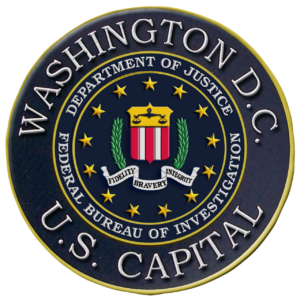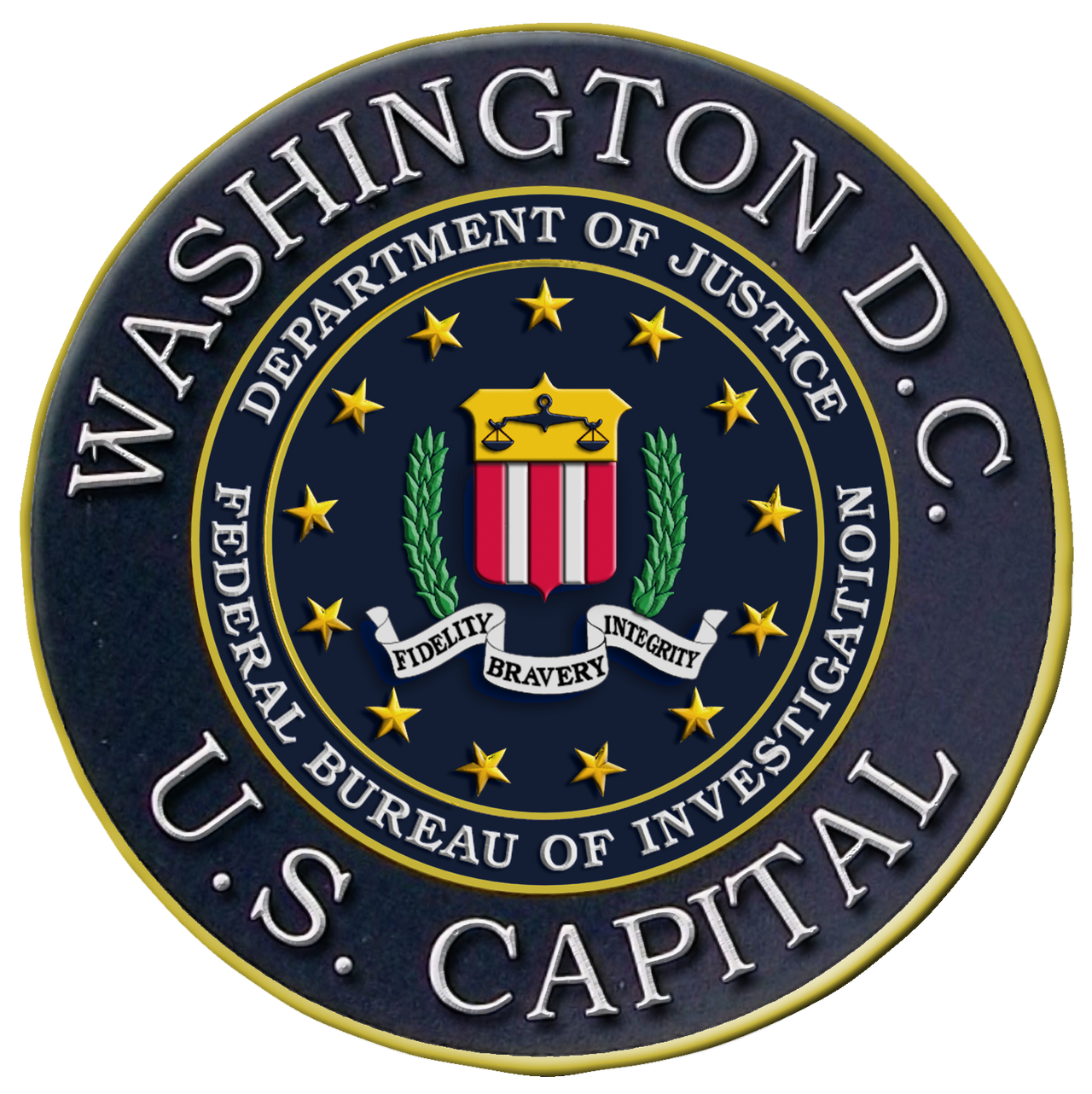FBI Headquarters – Washington DC
Billy and Rosie take a cab back to the Hoover building in downtown DC, not far from the White House and their hotel. They have their IDs checked at the front desk, and then are granted clearance to enter the building. A uniformed security guard escorts them to the high-tech indoor shooting range where FBI agents and other federal law enforcement officials are required to routinely test and re-qualify themselves to carry a firearm.

Billy had been inside the iconic FBI headquarters building only twice before. The first time was five years earlier, just a year before the 2016 election, when he came to Washington with Shane from New Orleans to negotiate and secure his amnesty deal with the then President Obama. The second time was two years ago for a high-level, top secret briefing on a clandestine dark op assassination assignment involving the CIA and FBI counterterrorism departments, and Israel’s Mossad. Billy remembered the meeting in the FBI chief’s expansive corner office.
The target’s name was Kafir Mafoud. As Shane related it to Billy, he posed himself as a legitimate Jordanian businessman. But his fortune had been made in the dark, criminal underworld of international smuggling—selling guns, stolen military weaponry, and drugs to the highest bidder. He was from a Hashemite family who were originally Palestinian refugees. Forced from their home on the West Bank during one of Israel’s brutal crackdowns following the six-day war, they had fled into neighboring Jordan where they were granted political asylum.
Billy had a feeling what was coming, but he was quiet and listened.
Shane looked pointedly at Billy. “So, he is now a Jordanian citizen,” he told Billy with some chagrin, “and we can’t technically lay a hand on him. This job must be off the books—a dark op. That’s why I need you.”
There was, at the time, as Shane explained the situation, a Panamanian-flagged freighter off the coast of Lebanon with a stash of Stinger anti-aircraft missiles—stolen out of Iraq—birthed in its hold for intended delivery to Hezbollah waiting the consummation of the sale and the wire transfer of money into an anonymous, numbered Cyprus bank account. The Israelis feared that if the missiles were delivered to Hezbollah, they would be used to shoot down Israeli military jets—or possibly—civilian aircraft in an act of terrorism. In the estimation of the Mossad, Israel’s vaunted intelligence service, Kafir Mafoud needed to be stopped—eliminated—once and for all. Normally the Mossad would handle a problem of this nature, but Israel needed the cooperation of Jordan in any future peace negotiations with the Palestinians so there could be no visible connection to Israel, no traceable fingerprints on the assassination of a Jordanian citizen.
“Under normal circumstances,” Shane had told Billy, with an entirely straight face, “the U.S. should not be assassinating Jordanian businessmen.” Then, with a curious little smile. “But the prime minister of Israel is pushing this thing, taking advantage of his cozy relationship with this president—through his son-in-law, The Court Jester—to get us to do Israel’s dirty work.” At that point he paused, and the smile disappeared. “Because of that we’re getting serious pressure from the administration’s national security team.”
Billy quietly listened, and Shane was most emphatic.
“I don’t want to have the CIA involved. This is not our problem, and I do not want to have anything to do with it. The guy in the White House is too stupid to understand or appreciate the grave implications of what could happen—the embarrassing political fall-out for the United States—if something goes wrong. This has all the earmarks of a political and diplomatic disaster, the potential to blow-up into a major international incident.”
He paused, took a deep breath, and looked meaningfully at Billy. “Like I said, we’re not supposed to be assassinating citizens of friendly countries. The House and Senate intel committees would want my head on the proverbial platter, and our president would be only too happy to hand it to them.”
Shane stopped and frowned. “The president has been doing everything he can to discredit the entire Intel community. If this thing turns to shit, he will just dust off his hands, blame the CIA, and I’ll spend the rest of my career testifying in front of congressional oversight committees.”
The CIA director’s eyes met Billy’s. “The president is a cut-throat son-of-a-bitch, Billy, who can never be trusted. His word on anything is not worth shit. But then this is Washington,” he smiled again, “nobody here can be trusted. You know that. These politicians are all working an angle to benefit their careers.”
Shane then, with a growing sense of desperation, looked at Billy and reiterated his plea. “I’ve got a mess here, Billy—nothing can go wrong. That’s why I need my best guy on this one.” He smirked and just laughed. “That criminal moron in the White House would love to lay this shit-show at my doorstep.”
Billy had a sense that the Republicans in the Congress had all, without shame or contrition, sold-out to the MAGA world in its worst, most virulent form. He did not like the politics surrounding the U.S. involvement with Israel. Neither did he have any sympathy with Arabs who used and exploited the plight of the Palestinians simply to enrich themselves and advance their own parochial, regional causes. His first inclination was that he did not want to be involved. From his jaundiced, cynical view, the current president was the epitome of—and had proved himself to be—the worst kind of greedy and grasping politician the United States could manufacture. His approach to politics—to every policy issue—was either political, what worked best with his base, or transactional, what was best for him personally. His open patronage of Israel, the transfer of the U.S. embassy to Jerusalem, had gained him the solid support of Evangelicals and the phony Christian pretenders in rural America that constituted his conservative base. He had shown so far in his presidency no appreciation—in fact, utter contempt—for the subtleties of diplomacy, the usual governmental inter-agency procedures, or the niceties of state department protocols. Encouraged by his son-in-law, The Court Jester, he wanted to help his buddy, Bibi, and solidify his support with his conservative base—no matter the cost to America. And no matter how complex the issue, everything with the sitting president was just another opportunistic photo-op, cheap reality show deal.
Billy was generally sympathetic toward the cause of Palestinian statehood and self-determination, and he considered the Israeli occupation of the West Bank and Gaza as illegal. Billy knew that the president’s son-in-law and Bibi Netanyahu were no friends of Palestinian statehood, and his first sense was that he did not want to get involved in Israeli politics. Billy neither liked nor trusted Bibi Netanyahu, convinced as he was that the disingenuous Israeli prime minister was—in his cynical, opportunistic way—just using a gullible U.S. president against his principal enemy, Iran. In his mind, however, Billy believed this was a job for the Mossad.
After having worked together for four years, on at least a half-dozen different secret assignments, Shane and Billy had developed a good rapport and a solid working relationship. Shane had made his first appeal to Billy as a friend. “You need to help me with this, Billy. The Navy has the USS Carl Vincent on standby in the Mediterranean twenty miles away from the freighter with two commando teams, more than fifty Navy Seals ready to take over the ship and seize control of the Stingers. But Mafoud first must be killed. The Israelis want him eliminated. And the White House and the NSC are all over me on this.” Ultimately, Shane made his final appeal to Billy’s patriotism, his sense of honor and duty.
Billy was reluctant, but— “Okay, I’ll do it,” he finally agrees, “with the strict proviso that I get double my usual fee for this one job.”
Shane breathes a heavy sigh, “Don’t worry. The money is no problem. As usual we’ll handle all the logistics and make payment into your specified Cayman Island numbered account.”
Downstairs in the basement of the FBI headquarters building, wearing the FBI provided headsets to protect their ears, Billy watches Rosie empty clip after clip into the moving, rotating, and stopping, man-sized down range targets. He had brought along an attaché case filled with ammunition for his Walther PPK and Rosie’s Glock. They are on the FBI shooting range almost two hours taking practice. Rosie is conscientious about her shooting and treats the whole exercise in a deadly serious manner. Using the service-style, two-hand grip that Billy taught her, she puts in an almost perfect performance. Again, Billy compliments her.
He smiles his satisfaction. “You’re good Rosie—very good!” he enthuses. “You have it down to a reflex action,” Billy says, then adds this proviso: “shooting inanimate targets is one thing—but aiming to kill another human being is something entirely different. But you have a good, naturally steady hand Rosie. In a pressure situation, when you are under threat, if you just keep to the basics of what I’ve taught you and remember to keep your cool—you’ll be alright.”
“Thanks to you, Billy,” she says with gratitude, “I’m gaining confidence.”
Back at the hotel, Rosie takes a short nap. Billy cleans and oils the guns. Then they both clean up and go downstairs to the dining room for dinner. Under the table, Billy slips Rosie the freshly cleaned Glock semi-automatic pistol.
Rosie smiles. “Thanks, I feel safe as long as I have this,” she says, returning the gun to her purse.
Around 10:00 o’clock, after a leisurely meal and a bottle of wine, they come back upstairs to Rosie’s room. They say goodnight and Billy turns to go through the connecting French doors to his room.
“Billy!” Rosie calls to his back as he is leaving.
Billy turns back. “Yeah?”
Rosie makes a little smile. “Thanks for all you do for me, Billy.”
He just grins. “My pleasure—Fred.”
An hour later, Billy is just getting into bed. Outside in the hall the door to the elevator opens. Two large men in dark suits step out. They check in both directions to make sure there is no one else on the floor. They each take a pistol out from the chest holsters under their jackets and proceed down the hall to Rosie’s door.
Inside, the room is dark. Rosie is in bed, but she is still fully awake when she hears the lock click and the door squeak open. She is sure she had locked it when she and Billy returned earlier. In a small panic, Rosie reaches under her pillow, searches with her hand until she has the Glock semi-automatic pistol firmly in her grip. Then, almost in a reflex, she throws back the top blankets, hits the switch button on the table lamp next to the bed, and adroitly rolls off the edge of the mattress onto the floor. A dim yellowish glow of light fills the room. Rosie keeps her head down, shelters herself against the side of the bed, breathes deep, and gives a partial pull on the trigger to disengage the gun safety. When she comes up from behind the side of the bed, she sees the face and looming figure of a large man in the middle of the room. There is a muted muzzle flash, and she hears the distinctive, muffled sound of a silencer. A bullet goes into the pillow on the bed where she had just had her head. Rosie brings her gun up with a two-hand grip, aims, and squeezes off her first shot. Another muzzle flash in the darkened room, and the man stops in his tracks, draws up a little and collapses to the floor. The man behind, his gun aimed and ready, fires off a shot. The bullet strikes the table lamp next to Rosie’s head. She squeezes off two quick shots.
On the other side of the connecting French doors, sitting up in his bed, Billy hears the familiar muffled sound of a Glock suppressor. He bounds out of bed, and, wearing just a pair of shorts, goes through the doors into Rosie’s room. There, in the middle of the room, are the bodies of two large men sprawled on the floor. Rosie is sitting hunched over on the edge of the bed, the semi-automatic Glock in her lap. Billy immediately goes to her. He kneels at her feet, takes hold of her hand, and looks up into her face. There are big tears rolling down her cheeks and she is visibly shaking.
“Are you okay, Rosie,” Billy asks in a concerned voice.
Rosie nods. “Yes,” says in a little whimper. “I’m okay, Billy, but I’m scared. I am so scared. They are not going to stop until they kill me. I’m just lucky those Russians are such lousy shots.”
Come with me, Rosie.” Billy takes her hands, helps her up, and leads her past the two corpses on the floor and through the door into his room. He helps her into his bed and covers her with the blanket and comforter.
“You’re going to sleep here Rosie, and I’ll be right over there.” Billy points to the couch in the middle of the room.
Billy fluffs the pillow up. “You relax now. I’m going to call Shane. He will need to get a disposal team over here to take away the bodies and clean up the mess before the housekeepers come in the morning.”
“Can I get you anything, Rosie, a drink, or a glass of water?”
Rosie slowly shakes her head. “No, I’m okay, Billy. You call Shane, but first you should probably put your pants on.”
Billy looks down and laughs. “Oh, yeah. You’re right.” Billy smiles. “I better put some pants on. After all, I wouldn’t want to embarrass or offend you—partner.” This is said with honest affection. It seems like a small jest meant to deflect the tension of the moment. But Rosie is impressed by his concern for her safety.
She makes a little smile. “Nothing you do would ever embarrass or offend me, Billy. Right now, you’re the best—the only friend I have.”
” He lifts her chin up, and then their eyes meet in a moment of special closeness and coming together. He affectionately kisses the side of her cheek. “Don’t worry Rosie,” he says. “It’ll be okay. We’re in this together now, and I’m not going to let anything happen to you.”
Billy puts his pants on and sits down on the couch. He takes his phone out of his jacket pocket and calls his friend, Shane, at the CIA.

